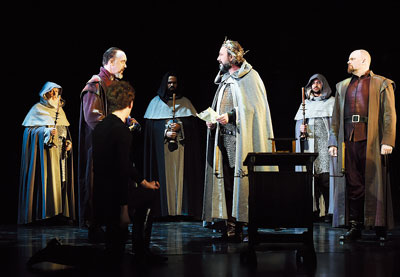 AUDIENCES in China who are familiar with William Shakespeare’s tragic prince from the play “Hamlet” will now get a chance to find out more about the iconic dramatist’s other royal character Prince Hal from his wayward youth in England to his battles later when they watch “Henry IV, Part I,” “Henry IV, Part II” and “Henry V.” The plays are about the troubled rule of King Henry IV and his son, Hal, who revels in the company of his friend Falstaff as his father prepares for war. Falstaff is sent to the countryside to recruit fresh troops, but he gleefully indulges in the business of lining his own pockets. As the king’s health fails and the crown comes under threat, the prince must face his responsibilities. The Royal Shakespeare Company performed the plays at the National Center for the Performing Arts in Beijing last week. They will be staged in Shanghai on Feb. 25-28 and Hong Kong in March as part of a series of events in China to mark Shakespeare’s 400th death anniversary this year. Gregory Doran, artistic director of the RSC, directed “Henry V,” “Henry IV, Part I” and “Henry IV, Part II” from autumn to January, under the banner “King and Country,” to launch the theater’s main repertoire in China. The director says it would be “misleading” to call them “history plays” because then that would simply imply that they are about British history. “Ultimately, the plays are about father-son relationships, about family, about control and abuse of power, about justice and the justification or otherwise of going to war,” Doran told China Daily. They trace the journey of a young prince through his experiences of accepting responsibilities and learning to be a leader, he said. “‘Henry IV’ shows a vast panorama of society from the king at the top down to prostitutes while ‘Henry V’ is really about war and about the experience of going to war.” It shows you the challenges a society as a whole faces when engaged in conflict, he said. Wang Xiaoying, a Chinese director who has directed Shakespeare’s “Richard III” and presented the play at Globe Theater in London in 2012, said, “The ‘Henry’ series is really an extraordinary epic of life. The plays have a vast panoply of wonderful characters. Some parts are very funny, and some are tragic and also very moving.” Shakespeare is relevant to people today, even after 400 years, said Pu Cunxin, a popular Chinese actor and director of the Beijing People’s Arts Theater. “He still manages to speak to us, about the human heart, in the most memorable and astonishing language,” said Pu, who once played the role of Hamlet. To Doran, who began his career with the RSC as an actor in 1987, Shakespeare has provided him the “passport of life.” He believes the same is true of other fans of the Bard of Avon. “As a child you are grabbed by stories of ghosts, witches, fairies, shipwrecks and battles. And later on, you become intrigued by the great richness of his language, very memorable phrases and the beauty of that language,” he said. “Somebody once said that speaking Shakespeare is like having a jewel in your mouth.” Readers of his plays are also fascinated by Shakespeare’s insights into politics, his layered characters and the “360-degree” projection of their emotions — love, passion, obsession, jealousy, ambition, grief and despair. “Shakespeare gives us words where words fail us. He understands us, he knows our capacity for greatness and for cruelty. He is the greatest humanist, the greatest storyteller, and the most compassionate writer known to us,” Doran added. The RSC also held workshops for Chinese theater directors and actors at the NCPA on Monday. Jacqui O’Hanlon from the theater company gave classes to children Saturday. This tour is just the start of the RSC’s work in China. They are working on translated Chinese dramas and plan to take them to Shanghai in October. Doran directed “The Orphan of Zhao,” a Chinese play, in 2012 on a Chinese dramatist’s recommendation. He says that during his research for the play, he discovered a rich theme of drama prevalent toward the end of the Yuan Dynasty (1271-1368) and the beginning of the Ming Dynasty (1368-1644). There is little knowledge about this in Britain. He wanted to find out more about it, but translations of old Chinese plays weren’t widely available in English. The RSC then got involved in a project with some Chinese theaters to translate more Chinese plays and classics into English. (China Daily) | 
